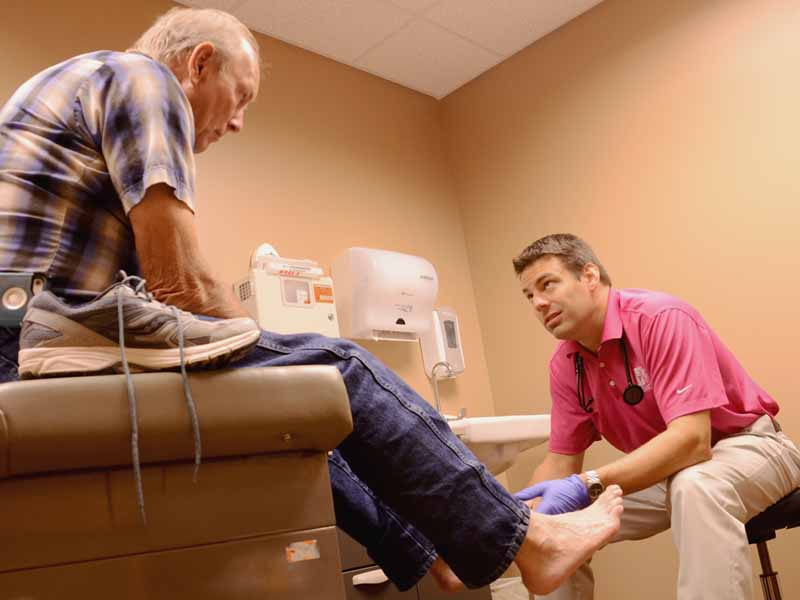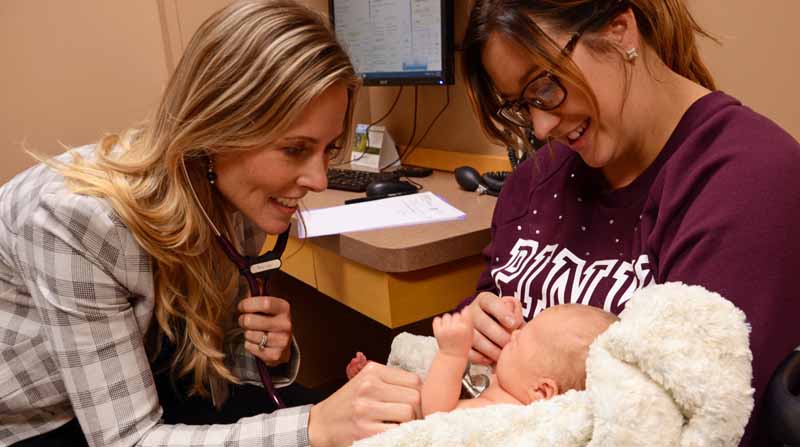Family Physician Couple Returns to Rural Roots in Minnesota
October 18, 2019 04:09 pm Sheri Porter Sleepy Eye, Minn. – It's a chilly Friday night in mid-September and the St. Mary's High School football team has traveled from Sleepy Eye, Minn. -- population about 3,200 -- to Hector, 31 miles to the north, to take on the Mustangs, a local rival.
Down on the field, among all those eager young players for the St. Mary's Knights, is family physician Adam Armbruster, M.D., who volunteers as the assistant coach.
No, his son is not on the team; Henry is 4 years old and playing in the stands along with his 6- and 8-year-old sisters. Adam's wife, Karlyn Armbruster, M.D., has brought the entire family to watch the game, and on this particular night, AAFP News was invited to join them after shadowing the Armbrusters for a couple of days at the Sleepy Eye Medical Center.
Theirs is a story about rural health and family physicians who love their work, call their patients friends and make time to support their community.
A Day at the Office
Adam Armbruster has a small saltwater aquarium in his office at the Sleepy Eye clinic. Watching fish swim back and forth is good for stress relief, he says with a smile.

When patient Neil "Chuck" Case says he needs to make an appointment with a clinician in the Twin Cities about some foot issues, Adam Armbruster, M.D., is quick to respond: "You don't need to see a podiatrist; I can do that."
But as it turns out, this will be a low-stress day that begins with a check-in on an elderly hospitalized patient. From there, it's a quick walk through a few hospital corridors to the clinic, where patients already are waiting.
Adam grew up in Sleepy Eye and he knows all his patients by name -- and their nicknames, too. As he moves from one exam room to the next, Adam greets each person and chats about families, jobs and life in general before he ever touches on a medical issue.
Midway through the morning, a foot check on a male patient rapidly moves into a discussion about Red Wing work boots versus cowboy boots; Adam chuckles and suggests his patient invest in some new socks. It's clear both are enjoying the encounter.
Adam explains that he inherited an older patient panel just months after he and Karlyn moved here. But he enjoys acute care and is certified in primary care endoscopy. In fact, the opportunity to do procedures was a big reason the two family physicians landed here.
Story Highlights
Crunch Time
Despite the easy patient flow on this particular day, practicing rural medicine in Sleepy Eye can be humbling -- and hard.
"We had a young kid who came to the ER in cardiac arrest. It was a farm accident. We weren't able to save him, but we got his heart back and we were able to get him transferred up to the Twin Cities where he was able to donate organs to a huge number of people," says Adam. "I think that was a small consolation to his family."
Adam provides 24-hour ER coverage from 8 a.m. Monday to 8 a.m. Tuesday and one weekend a month. "We are the only ER doctors," he says, referring to the four full-time family physicians who staff the hospital and the clinic. "There's nobody in-house, so if you're on call and there's a car accident, a stroke, a heart attack, you've got to come in," he says.
And then there's the weather. Winter in Minnesota can be extreme, and sometimes storms make it impossible for this critical-access hospital to arrange helicopter transport for patients who need to get to a larger facility for more comprehensive services.

New mom Samantha Trebesch is happy to have Karlyn Armbruster, M.D., check on the infant the physician delivered not long ago. As is typical with newborn exams, Armbruster makes sure little Hadley Kerkhoff never leaves the comfort of her mother's arms.
"Sometimes I have to hold onto something I don't want to," says Adam. He talks about an ER patient in her 30s who was experiencing prolonged heart pauses but couldn't be transferred out because of a raging snowstorm. "We had to stay here and watch her on the heart monitor all night until transport was possible," he says.
Another patient, pregnant with her first baby, came to the ER with minor cramping. "We checked her and she was dilated to 5 cm at 32 weeks. Helicopters weren't able to fly because of fog and she was too advanced to transfer by ground," he says.
A NICU team drove from Children's Hospital in Minneapolis to Sleepy Eye -- about a two-hour trip when the weather is good. "They ended up sitting with me for a couple of hours until we got the baby delivered. Then they transported the baby to the NICU in Minneapolis and we took care of Mom here," says Adam.
Although all four FPs deliver babies, only Adam, Karlyn and the hospital's full-time general surgeon perform C-sections. The couple depend on family and friends when those late-night emergencies occur.
"Karlyn and I do the vast majority of our C-sections together, and if something happens at 4 a.m., it's usually my dad who comes to the house to stay with our kids," says Adam. But there have been nights when he or Karlyn have transported three sleepy Armbruster kids to a friend's house on the way to the hospital.
Relationships Take Time
Karlyn also fills her clinic day with patients -- the majority of them new moms, pregnant moms, and lots of babies. Her eyes light up and her smile widens as she coos to her tiniest patients. She calls one infant "little pumpkin" and another "nugget," and encourages a fussy 2-week-old to "just snuggle into your mom."
Karlyn can relate to these moms -- and the joys and struggles they face daily.
She builds relationships with her patients by giving each appointment the time it requires and is happiest when a full day means 13-15 appointments.
"I need to fulfill patients' needs and do my job," says Karlyn. "If I'm sending someone out too quickly, I may miss something that results in either a complication or a poor outcome. Sometimes I need to wiggle through and read between the lines to get at a problem a patient hasn't brought up."
Like Adam, Karlyn was trained in and thrives on practicing full-scope family medicine. Although endoscopies are not on her menu of services, Karlyn does provide colposcopy and hysteroscopy procedures for patients. "I couldn't have this kind of practice in an urban setting," she says.
Karlyn has a deep attachment to this town, and she has devoted much time and energy to a project she and Adam hope will spur redevelopment on Main Street. A while back, the Armbrusters bought the long-shuttered Pix movie theater. After months of renovation -- and realizing Karlyn's vision for the interior -- the site will soon reopen as a coffee shop and microbrewery.
When it comes to medical matters, Karlyn has her own collection of difficult memories.
She recalls a pregnant woman who, for health reasons, needed to be induced at 37 weeks. After laboring for a bit, the patient experienced pain and bleeding, and the baby's heart tones diminished. An emergency C-section was performed and placental abruption discovered.
"Thank the Lord it was the middle of the day, which meant surgical staff were here and we had anesthesia in-house. That baby was born in about 20 minutes, which is a great response time for a rural hospital," says Karlyn.
"It was one of those days when I went home and every inch of my body was tingling -- my mind was spinning. I was exhausted but I couldn't sleep. It was one of those things I will never forget and never want to happen again," she says.
Gaining the OB Advantage
Sleepy Eye Medical Center has always been owned by the city, says hospital administrator Kevin Sellheim. He told AAFP News that the facility has been its current location since 1941.
"People here understand the benefit of having health care access in the community versus having to travel. It's comforting to know you're only blocks away from our emergency room," says Sellheim.
The hospital has made a lot of changes since Sellheim arrived 17 years ago.
"In 2002, we were not delivering babies at our facility," he says. And because women were forced to travel to other towns for obstetrical care, they developed relationships with health care professionals outside of Sleepy Eye.
"When we were finally able to get back into obstetrics, it changed the makeup of our patient mix," says Sellheim. "Our ability to provide OB services was greatly enhanced with the successful recruitment of the Armbrusters in 2012. Their OB skills -- with the added benefit of C-section deliveries -- have made local families feel very confident," he says.
In August, the hospital recorded 20 hospital admissions, seven of them OB patients. In 2018, 54 babies were delivered at the hospital, and the facility is on pace to meet that number this year. "Having the capacity to care for moms and babies for years to come is critical to our long-term success," says Sellheim.
The hospital has an annual payroll of $8.7 million, and the vast majority of employees live in town, which fuels the local economy.
"And access to health care is critical for individuals and businesses looking to relocate here," Sellheim adds. "I can't envision what Sleepy Eye would look like without the hospital; it's been part of our local fabric for nearly 79 years."
Related AAFP News Coverage
Focus on Rural Health
Full-scope Family Medicine Flourishes in Southwestern Kansas
(7/8/2019)
StageCoach Family Medicine
Solo FP Finds Fulfillment Servings Rural Patients, Community
(10/3/2018)
Serving the Community
Rural FP Finds Rewards With Full-scope Training, Deep Roots
(12/19/2018)
Loving Frontier Medicine
Family Physicians Earn Respect in Remote Valdez, Alaska
(6/6/2018)